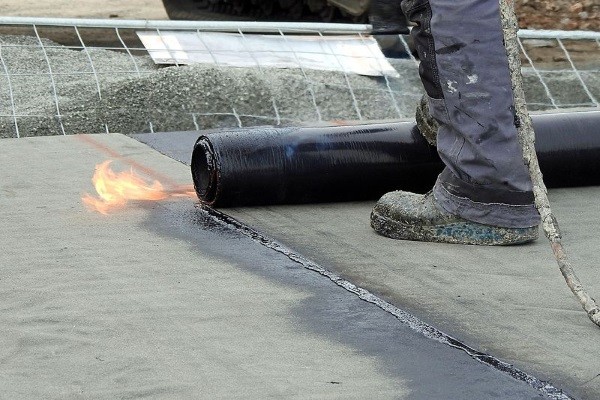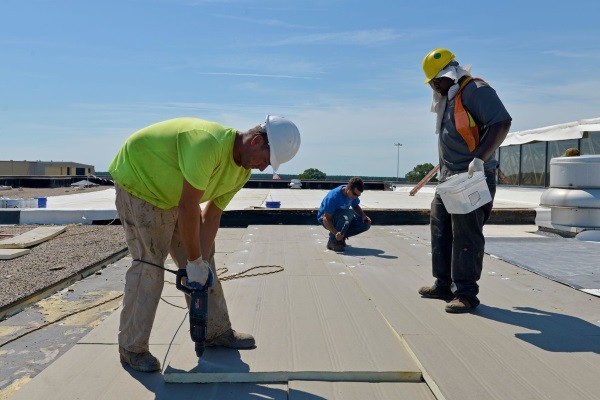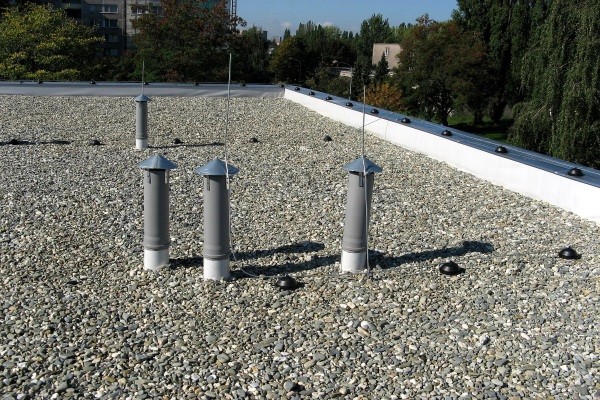Most Youngstown property owners believe that tar and gravel roof life expectancy goes beyond modified bitumen roofs. Most of them choose from either of these two materials because of their durability and affordability.
However, which one of them is truly the best to use? Is a modified bitumen roof always the best material against hail, snow, and rain? Or are traditional gravel roof systems still the best to give properties a natural-looking roof with adequate durability? Are both materials better than other traditional commercial roofing materials available?
After reading this post you’ll know more about:
- Tar and gravel roof pros and cons
- And modified bitumen roof pros and cons
- The best material to use for any property
Tar and Gravel Roof Life Expectancy: What are Tar and Gravel Roofs?
Tar and gravel roofs give properties a traditional flat roof aesthetic. In the early 20th century, most properties will use tar and pebble before some pioneering contractors used tar and gravel to construct the roofs.
Their construction process is simple. The contractors will mix asphalt and tar over the waterproof roofing membrane or felt of the roof. Then, they add a gravel mixture over the top of this layer. Contractors usually recommend thickening the waterproof membrane or felt to improve the watertight seal of the roof.
The average tar and gravel roof life expectancy is 20-25 years on average. However, with effective tar and gravel roof maintenance, you can get 30+ years from the roof.
Advantages
Aesthetically Beautiful
Similar to a pebble beach or gravel-ground garden, flat roofs with tar and gravel are pleasing to the eyes. In addition, tenants or property owners can use their rooftop to house heavy equipment or become a function area.
Foot traffic does not affect tar and gravel roof life expectancy significantly. Therefore, commercial flat roof properties such as hotels use them to their advantage. In fact, some property owners experiment with different types of stones to introduce different aesthetics to their flat roofs.
Dense and Sturdy
Tar and gravel roof life expectancy lengthens because of its material density. Therefore, affordable single-layer tar and gravel roofs have notable but not exceptional durability.
If you’re willing to spend more to add more tar-caked waterproof layers, you will add more weight to your roof and require additional roofing joists. However, you will have improved the durability and longevity of your roof over time.
Therefore, a well-installed and dense roof of this kind has notable sturdiness and durability. While the tar and gravel roof replacement cost might inflate highly, you are making an investment in a proper roof.
A Precursor to Green Roofing
The waterproof layers underneath tar and gravel roofs create a watertight seal. Once the gravel dries, property owners thinking of owning green roofs can do the conversion conveniently. In fact, this improves the tar and gravel roof life expectancy.
While they may spend more to create additional roofing support structures, they will gain better offsets because of the tax-reducing capabilities of green roofs.
Additionally, they improve the overall insulation of their property. Green roofs improve UV ray absorption, retain moisture, and produce oxygen from carbon dioxide through its plants.

Disadvantages
Post-Construction Noxious Smells
Why many property owners look for tar and gravel roof alternatives is because of its noxious smells. Tar is a smelly chemical. Anyone with a sensitive nose might suffer from nausea or sickness because of the scent. However, you still have an exceptional tar and gravel roof life expectancy despite this disadvantage.
In fact, contractors wear specialty masks to protect their sense of smell. Because of the chemical smell, the property owner might have to consider temporarily abandoning the property and allow the scent to pass.
Takes Some Time to Construct
Many Youngstown property owners look for tar and gravel roof replacement options because they take time to construct. In addition to forced temporary eviction because of its post-construction smell, tar and gravel roofs are separate materials mixed into a single layer that functions as a waterproof roof barrier.
Aside from losing profits due to property inactivity, property owners might pay contractors for long hours, which add to the overall expenses. Additionally, they’ll have to go through the entire expenses once again for any tar and gravel roof repair needs in the future.
What are Modified Bitumen Roofs?
Most Youngstown property owners want to replace tar and gravel roof with shingles for commercial properties. However, the best commercial shingles can be expensive. Therefore, modified bitumen is a better alternative.
Modified bitumen or “torch-down” roofing uses rubberized asphalt. Then, a torch will melt or heat-weld the membrane to the roofing sheath directly. Contractors usually install modified bitumen roofs with adequate overlaps to ensure a watertight seal over the entire flat roof area.
Aesthetically, they are similar to the appearance and even the benefits of flat membrane roofs to a point.
The life expectancy of a modified bitumen roof is about 20-25 years, similar to tar and gravel roof life expectancy.
Advantages
Quick Installation
Modified bitumen roofs are quick to install compared to tar and gravel roofs. In fact, they will not require any work disruption because they have no noxious fumes. Most projects end within 1-2 weeks if all materials — namely asphalt rolls — are available on the spot. Quick installation means great news to property owners because they spend less on labor time.
Better Durability
A single layer of tar and gravel is not enough to ensure long-term durability and foot-traffic endurance. Therefore, property owners have to add more layers to ensure its durability.
Modified bitumen roofs are popular because they can withstand foot traffic effectively. In addition, their density makes them tear-resistant, which makes them perfect for foot traffic that most hotel rooftops endure daily.
Recyclable
Modified bitumen roofs are completely recyclable as tar and gravel roofs, which make them one of the best tar and gravel roof replacement options available
Disadvantages
Requires an Open Flame to Install
Most modified bitumen roofs use heat-welders or torches to construct. Therefore, the fire risk is extremely high during your roof installation or replacement. In addition, you’ll need to spend a little more to obtain a permit to use fire during your construction phase.

Needs a Qualified Contractor
Most modified bitumen manufacturers make it easy for property owners to find a contractor they trained and licensed to install their roofs. Unfortunately, some of these roofers have high contractual rates. However, you are making an investment towards a long-term and durable roof.

Wrapping Up
Both tar and gravel and modified bitumen offer great advantages to homeowners. Unfortunately, both these roofing materials take much more construction or replacement time.
We believe it is better to use single-ply roofing membranes that do not require open flames to install such as EPDM or TPO. Additionally, you can have better insulation and long-term roof lifespan by applying spray polyurethane foam on your roof. In fact, investing in Conklin spray foam systems is better because they guarantee decades of added lifespan for your property roof.
J&M Roofing Systems is a Conklin-qualified roofing contractor specializing in commercial metal roofing, single-ply membrane roofing, and spray polyurethane foam roofing. Call us if you need to invest in a long-term and effective roofing solution.

